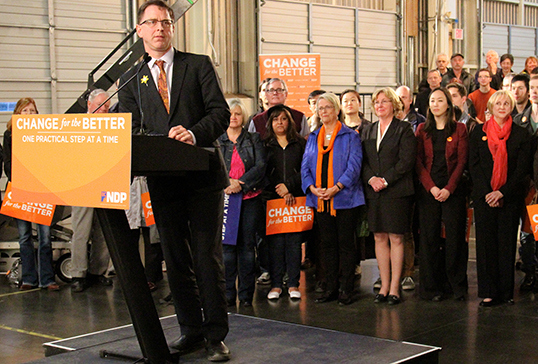We’ve got several articles forthcoming over the next couple of weeks on issues related to tar sands pipelines in B.C. — a hot button election issue that has proven more surprising and controversial than expected.
Here’s my latest column on the B.C. election campaign, originally published in The Source newspaper in Vancouver, which looks at the NDP’s underwhelming campaign pledges for addressing poverty. For more B.C. election-related news, visit our issues page here.
*
The B.C. election campaign is now in full swing, and the B.C. NDP maintains a substantial lead in the polls. A dishonest, regressive government that has held power for a dozen years is about to be swept away. And yet there’s a noticeable lack of excitement in the air — at least amongst many of the victims of this B.C. Liberal government.
Part of it is the messaging of the B.C. NDP. “Change for the better, one practical step at a time” –the party’s main slogan — is an ultra-deliberate effort to tamp down expectations. To the province’s establishment it’s reassuring, and indeed many of them, weary of Christy Clark’s incompetence, appear willing to give the B.C. NDP a chance.
The whole election campaign feels a bit anticlimactic.
When the B.C. Liberals first took power back in 2001, Gordon Campbell’s behaviour was more like ‘radical change, as much all at once as possible.’ Union contracts were ripped up, BC Rail was privatized, the Labour Code was changed dramatically — and much more. Campbell’s cuts did spark resistance – there were large labour mobilizations in 2002 and many spirited, militant anti-poverty actions – but ultimately were carried out due to a lack of political opposition. Campbell and the B.C. Liberals seized the moment to push through their regressive agenda.
When Adrian Dix and the B.C. NDP take office — I’m assuming they will, with a significant majority — many will rightfully look to the new government to seize the moment for a progressive agenda. But it looks like they will be frustrated in these hopes.
Take, for example, this week’s campaign announcement from the B.C. NDP on welfare rates. Welfare rates have remained abysmally low under the Liberals, contributing to rising rates of poverty and child poverty. The current rate is a paltry $610/month for a single person, including a $375 housing allowance, which leaves a mere $235 for food and other expenses.
Adrienne Montani, a spokesperson for First Call, a child and youth advocacy coalition, writing in the Georgia Straight, recommended “an immediate increase of $200 a month for a single person, $300 a month for couples without children, and $400 a month for families with children.” Especially in a hyper-expensive city like Vancouver, these represent extremely modest proposed rate increases.
So, what has the B.C. NDP promised to do about welfare rates? Their campaign platform promises an increase of $20 per month. Twenty dollars.
Bill Hopwood, an organizer with the Raise the Rates coalition, had a succinct response: “It won’t tackle poverty one iota.”
Raise the Rates activists have good reason to be disappointed. Just last month, they held a 15 kilometre march, travelling from Christy Clark’s constituency office on the west side of Vancouver all the way to Adrian Dix’s office in Vancouver-Kingsway. To Dix’s credit, he greeted the marchers at his office, listening to their concerns. He even addressed their rally, saying “I don’t know if you’ll be happy or not happy, but [our election platform] will definitely address our desire to address poverty. ”
Unfortunately what we see in the platform is a mere $20 a month.
The platform does also contain, it should be noted, a boost in assistance to those living in poverty with children. The B.C. NDP would increase the bonus for families by up to $829 a year for each child under 18 years of age. This is significant and commendable — but no excuse for the feeble increase planned for welfare rates.
B.C. is a province awash in wealth, much of it on ostentatious display. There is simply no excuse for anyone to be malnourished, homeless and otherwise severely indigent.
The tepid promises of the B.C. NDP on welfare rates indicate that even with the B.C. Liberals out, neoliberalism will remain mostly in command – for now. Reversing this state of affairs is an ideological and political battle that must continue, one step at a time. Here’s to more marches to Adrian Dix’s office after May 14.




